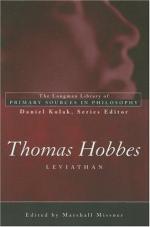|
This section contains 2,615 words (approx. 9 pages at 300 words per page) |

|
Thomas Hobbes (1588–1679) was born in Westport, England, on April 5, the son of a clergyman; he was a contemporary of Shakespeare. Hobbes developed a moral and political philosophy that was influenced greatly by geometry and the new sciences of the Enlightenment. After studying at Oxford University Hobbes became a tutor for the Cavendish family and escorted his charges on tours of the European continent. During those travels Hobbes became acquainted with science as it was being developed by Galileo Galilei (1564–1642), René Descartes (1596–1650), and Marin Mersenne (1548–1648), which he found more constructive than the political strife that characterized the English civil war (1639–1651).
Hobbes's political thought first was expounded at length in The Elements of Law (1640), which defended the monarchy, although on democratic grounds. He subsequently developed his arguments in De cive (1642), De corpore (1655), and De homine (1658), a trilogy on the state, physics, and anthropology in which Hobbes attempted to...
|
This section contains 2,615 words (approx. 9 pages at 300 words per page) |

|


